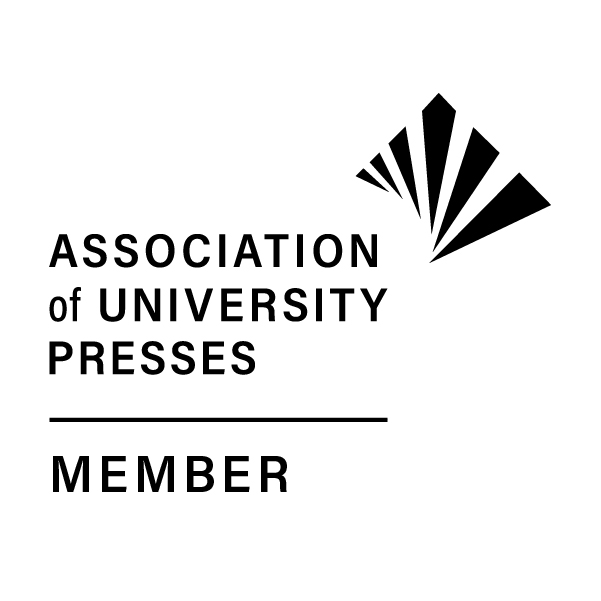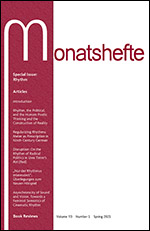|


|

Subscribe
Read the Journal Online
Submission Guidelines
Editorial Board
Receive Email Updates
Advertise in Monatshefte
Indexes/Abstracts
Current Issue TOC
Back Issues TOC
Monatshefte 2022 Subscription Rates
Institutions:
print & online $271
online only $233
Individuals:
print & online $103
online only $86
Non U.S. Postage (no postage charges for online-only subscriptions)
Airmail: add $40/yr.
Canadian Subscribers: add 5% GST. |
Monatshefte
Volume 92, Number 3, Fall 2000 Table of Contents
Goethe Special Issue
Articles
Klaus L. Berghahn
Nachlese zu Goethe
Abstract:
The introduction to this special issue on Goethe is based on personal observations of some events of the Goethe year; this explains its subjective viewpoint. It attempts to deal with the following basic questions: How was Goethe’s 250th birthday celebrated? What aspects of Goethe’s œuvre are still relevant for us and how were they discussed in public? Does Goethe still speak to modern readers and how do we teach him? Answers to these questions indicate mixed assessments. Weimar profited greatly as a tourist attraction, but the public discourse on Goethe was rather mute—except for a heated debate among Goethe scholars about the merits of Daniel Wilson’s excavations concerning the activities of the privy councillor Goethe. Yet this debate, Sigrid Damm’s bestseller on Christiane Goethe, and several conferences on Goethe demonstrate that Goethe speaks not only to a small elite but to a wider audience. It is still worthwhile to return to Germany’s greatest poet. (KLB) (In German)
Ludger Lütkehaus
“Im Anfang war das Wort, und Gott war ein Wort.” Sprachkritik bei Fritz Mauthner und Goethe
Abstract:
Fritz Mauthner, philosopher, writer, and founder of a radical philosophical critique of language, has recently enjoyed a kind of Renaissance. The fact that the Goethe-year 1999 is simultaneously the 150th anniversary of Mauthner’s birth makes this article concerning their relationship seem especially timely. Both engage in a radical critique of language, above all of the “word of all words,” which was “in the beginning” as “logos.” Admittedly, in the end Goethe places more faith in words and language than does Mauthner. This investigation of the complex interconnections between Goethe and Mauthner interprets the Faust tragedy as an extremely witty semiotic tragicomedy, Faustian in its seeking, Mephistophelian in its spirit. (LL) (In German)
Brigitte E. Jirku
Mignon: Rätsel oder Geheimnis
Abstract:
This article considers Mignon as a person in her own right and analyzes the major changes she undergoes in her relationship with Wilhelm Meister. Mignon experiences essential moments which determine the course of her life and ultimately lead to her death: in the “adoption scene” Wilhelm promises her eternal faithfulness; the night following the performance of Hamlet, Wilhelm betrays Mignon for the first time; and Therese’s arrival at Natalie’s home can be considered as Wilhelm’s second and more definitive betrayal. Each event is followed by major changes in Mignon. This interpretation shows an affinity of the souls of Natalie and Mignon. The latter, as a mythical and godly being, understands and presents intuitively the action of the Society of the Tower. (BEJ) (In German)
Fritz Breithaupt
Culture of Images: Limitation in Goethe’s Wahlverwandtschaften
Abstract:
According to Goethe, all cultural achievements are fixations by images. Images do not show “reality” as it is, but rather frame it and thereby bring about a reality effect: the landscape appears on a map, the deceased in a monument, and the soul in written words. In self-consciousness, the self, which should be the object of knowledge, is not understood, but instead is replaced by a mere image of the self. Especially in Die Wahlverwandtschaften, Goethe presents this process of culturation as a process that involves a loss, without providing a simple alternative to an uncontrolled nature, on the one hand, and the restrictions of a phenomenologically determined culture, on the other. Eduard’s limitlessness is his doom and Charlotte’s self-restriction appears as self-mutilation. Goethe’s hope rests in beauty, a beauty that is always more than an image can present. Thus beauty raises the claim for a future within the restricted present and makes history possible. (FB)
Marisa Siguan
Durchtanzte Schuhsolen und Heiligenbilder: Christiane versus Ottilie
Abstract:
The success of Sigrid Damm’s novel Christiane und Goethe shows how impassioned the controversy with literary tradition can be. Through an analysis of Damm’s novel and of several of Goethe’s literary figures, this article attempts to answer the following questions: (1) What does our image of Goethe gain from this indirect perspective of a contemporary writer focusing on Christiane, whose life was wholly determined by Goethe? (2) Why is it that a contemporary woman writer takes such a perspective? (3) What remains for us of Christiane or Cornelia Goethe, now literary figures, and what remains of Ottilie, the literary figure that can be considered as emblematic for Damm’s literary production? Specific attention is paid to the contradiction between the official and the private life of Goethe, showing its importance in his literary work, and to the development of the image of women in the nineteenth and twentieth centuries. (MS) (In German)
Barbara Hahn
Mit Geothe im Bad. Begegnungen in Exterritoralen: Rahel Levin, Sara und Marianne Meyer
Abstract:
Karlsbad, summer 1795: Goethe meets three young Jewish women from Berlin. With two of them, the Meyer sisters, a friendship begins, and an exchange of letters. Corresponding with Goethe, both women attempt to reflect upon their complicated relation to Jewish tradition and their difficulties integrating into a culture dominated by Christianity. On the other hand, the third, Rahel Levin, resists entering into a personal relationship with the famous author. By writing about Goethe, rather than to him, she establishes a new relationship to texts, and begins to free them from the domination of the institution of authorship. (BH) (In German)
Special Goethe Issue Reviews
Gabrielle Bersier. Goethes Rätselparodie der Romantik. Eine neue Lesart der Wahlverwandtschaften (Edward T. Larkin)
Carl Paschek. Das Goethe-Bild der Postmoderne 1975–1999 in Büchern und elektronischen Medien (Edward T. Larkin)
Nicholas Vazsonyi. Lukàcs Reads Goethe: From Aestheticism to Stalinism (Stephen K. Schindler)
W. Daniel Wilson. Unterirdische Gänge, Freimauerei und Politik (Harald S. Liehr)
W. Daniel Wilson. Das Goethe Tabu. Protest und Menschenrecht im klassischen Weimar (Harald S. Liehr)
Book Reviews
Notes
Monatshefte / Max Kade Institute Directory of German Studies 2000
Twenty-Fifth Annual Conference of the German Studies Association
Monatshefte’s subscription prices
|


